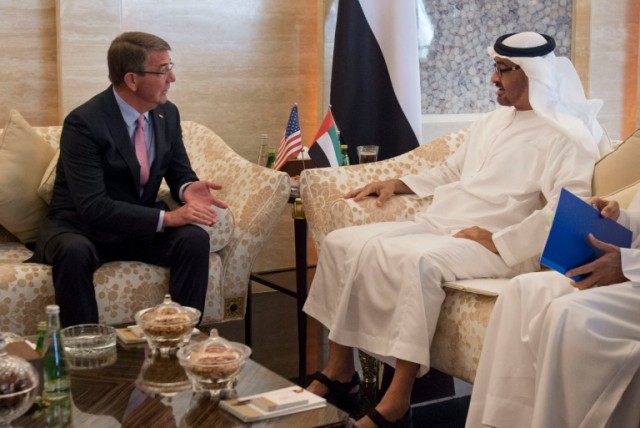Riyadh (AFP) – The United States is seeking greater special forces and naval cooperation with the Gulf states to counter Iran’s “destabilising activities” in the region, a senior American official said.
Defence Secretary Ashton Carter, who arrived in the Saudi capital on Tuesday, will meet his Gulf counterparts on Wednesday.
The following day he is expected to join President Barack Obama at a summit with monarchs of the six Gulf Cooperation Council states.
They will gather in an atmosphere of tension with regional leaders offended by Obama’s perceived reluctance to get involved in the region’s problems, and in particular his tilt towards Iran.
The Sunni Gulf monarchies are worried after the lifting this year of international sanctions against their regional rival, Shiite Iran, under an international agreement to curb Tehran’s nuclear programme.
Riyadh and its neighbours fear the US-supported deal will only embolden Iran which they accuse of interference throughout the Middle East.
Over the past 15 years the US has sold combat aircraft to Gulf states, but the senior American defence official said Iran’s activities “won’t be countered” in that way.
Rather, “special operations forces and maritime interdiction” are needed, he said.
The US is proposing to help train Gulf special forces and to develop their naval capacity to prevent Iran from supplying Shiite groups that it supports in the region, the official said.
In “just over a six month period we and our coalition partners were able to interdict four weapon shipments off the coast of Yemen”, he said.
The United States provides precision-guided weapons and intelligence support to a Saudi-led military coalition that intervened in Yemen 13 months ago to support the government against Iran-backed rebels.
Royal Saudi Air Force jets, many of them US-made F-15s, have carried out intensive air strikes against the rebels and their allies. The coalition maintains a naval blockade of Yemen.
Carter will also repeat to his GCC counterparts the importance of increased support for Iraq, where the government is trying to reconquer territory seized by the Islamic State group of Sunni extremists.
“We are urging them to come in… provide funds and support, both political and economic, to the Iraqi government,” the American official said.
Saudi Arabia’s ambassador to Iraq presented his credentials in January, re-establishing relations a quarter-century after they were cut following ex-president Saddam Hussein’s invasion of Kuwait.
“In a perfect world, we would see full diplomatic normalisation between all Gulf countries and the Iraqi government,” the official said.
“There has been some reluctance among the Gulf states”.
On Monday in Baghdad, Carter announced new US support for the Iraqi government, including the deployment of an additional 217 military personnel.
The Gulf Cooperation Council includes Saudi Arabia, Bahrain, the United Arab Emirates, Kuwait, Qatar and Oman.

COMMENTS
Please let us know if you're having issues with commenting.